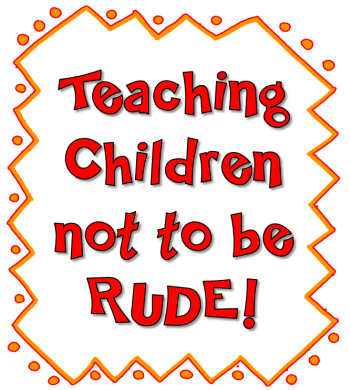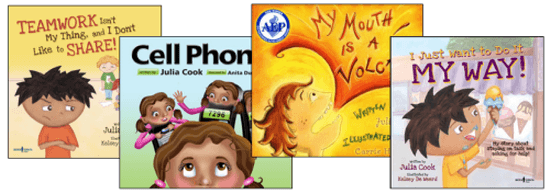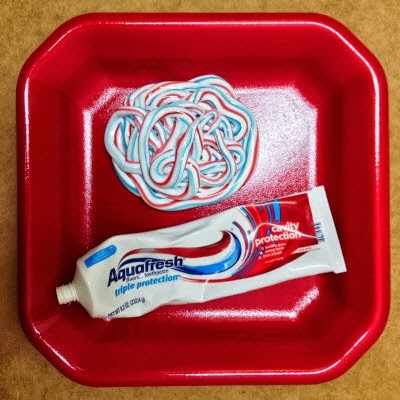Teaching Children Not to Be Rude!

Guest Blog Post by Julia Cook
As a school counselor, I would often have kids come into my office and expect me to wave my magic counseling wand and solve their problems for them. A good counselor, a good teacher, a good parent gives the wand to the child and teaches her how to wave it herself!
Rudeness is a learned behavior. Infants are born adorable, innocent, and teachable, but they are also selfish since all they know is their own tiny world. Without adults guiding them, they will never grow out of this self-centered perspective and will grow into rude children. It takes a village to help a child realize that the world is full of other people, and other people have feelings. Having good social skills is necessary for school success. Good social skills affect how the child will do on the playground, in the classroom, in the future work place, and in life in general.
What causes people to be rude?
Before we can help students overcome rudeness and learn to be more caring, it’s helpful to understand why people are rude. According to The Civility Solution – What to Do When People are Rude, by P.M. Farni, there are 11 causes of rudeness:
- Individualism and a lack of restraint – I’ll do it my way and I don’t care about what you think!
- Inflated self-worth – People who are self-absorbed don’t value others except as a means to fill needs and desires.
- Low self-worth – Being hostile and defensive is often a sign of insecurity
- Materialism – The quest for money and possessions is more important than showing kindness
- Injustice –An injustice may create feelings of envy, demoralization, depression, or outrage.
- Stress – People who are overworked or overwhelmed may be indifferent to those around them.
- Anonymity – If I don’t know you, it doesn’t matter how I treat you.
- Not needing others – We are becoming content with electronic isolation
- Mental health problems
- Anger
- Fear
How do we teach children not to be rude?
 We fail to guide and protect our children when we don’t teach them manners and respect for other people. One of the most valuable tools that we can give kids is the ability to connect with and relate to others. Rudeness damages others by creating stress, eroding self-worth, creating relationship problems, and making life difficult. When we are treated rudely by others, we often become vulnerable and self-doubting. Teaching children to be polite is not an all or none, but a continuum. Teaching a child just one single strategy toward politeness will better that child!
We fail to guide and protect our children when we don’t teach them manners and respect for other people. One of the most valuable tools that we can give kids is the ability to connect with and relate to others. Rudeness damages others by creating stress, eroding self-worth, creating relationship problems, and making life difficult. When we are treated rudely by others, we often become vulnerable and self-doubting. Teaching children to be polite is not an all or none, but a continuum. Teaching a child just one single strategy toward politeness will better that child!
- Start by setting a zero tolerance for rudeness in your classroom. Explain to your students that it is your job to help them grow to become the best that they can be. Let students know that rudeness is a damaging learned behavior, and you can and will teach them to unlearn it!
- When you see a child acting rudely, go back to the list above and try to figure out why they are choosing to act that way. If you can figure out the cause, it is much easier to develop the most effective solution. Use incidences of rudeness as teaching opportunities to better your students.
- Model politeness in every way possible – you are their coping instructor! If you are ever rude, recognize your behavior publically to your class and apologize.
- Show and feel empathy – based on the cards that child was dealt in life, he may be playing the best hand that he can to win the game of life. Teach children from where they are in the world, not from where you expect them to be.
- Read stories to your class that model positive behavior that counteracts rudeness. Have students point out how the characters acted rudely and discuss why they may have chosen to act that way, if they knew they were being rude, and what they did to overcome their rudeness.) Often times, if a child in a story book has a problem and learns to solve the problem, the reader can identify with the strategies used in the book and apply them in real life.

Your Thoughts are Private, but Behavior is Public
I often tell kids that “Your thoughts are private, but behavior is public.” You can think whatever you want to think, but the minute you let your thoughts out of your head through your words or your actions, they become public information. A great visual to explain this is the Toothpaste Squirt.

Toothpaste Squirt Demonstration (Teaching Kids Not to be Rude)
Materials Needed: Small tube of toothpaste and a small plate
Directions:
- Choose one student to come forward and squirt all of the toothpaste onto the plate.
- Ask the student if he/she can then put all of the toothpaste back into the tube.
- Explain that once the toothpaste comes out of the tube, you cannot get it all back in. This is much like a put-down or rude comment. Once a put-down comes out of my mouth and goes into your ears, I cannot take it back.
- Go onto explain that for each put-down a human hears, they must hear 10 pull-ups (or sincere compliments) to get back to where they were emotionally prior to the put down. (i.e. if a child gets 3 put downs in one day, he must get 30 compliments to get back to where he was…30!)
- Reiterate that thoughts are private, but behavior is public and the next time you think about giving a put down, think again and screw your lid to your toothpaste tube on tight!
The most important skill that we can teach children to help them succeed in life is the ability to get along with others in society. To do that, it takes a village. If we fail, the rest of the world will let us know, and our kids will be subjected to a life of ridicule, isolation, and despair. As a teacher…you are your students’ coping instructor! Model politeness, say NO to rudeness and keep making a positive difference!

Julia is nationally recognized as an award-winning children’s book author and parenting expert. She holds a Master’s Degree in Elementary School Counseling, and while serving as a guidance counselor, she often used children’s books to enhance her classroom lessons. Julia has written dozens of books that teach students to become life-long problem solvers. Many of her books can be used to teach kids not to be rude, including Cell Phoney, My Mouth is a Volcano, Teamwork Isn’t My Thing and I Don’t Like to Share, and I Want to Do it My Way! She enjoys visiting schools and talking with kids; in fact, she’s done over 800 school visits! You can learn more at her website, www.juliacookonline.com.

 We fail to guide and protect our children when we don’t teach them manners and respect for other people. One of the most valuable tools that we can give kids is the ability to connect with and relate to others. Rudeness damages others by creating stress, eroding self-worth, creating relationship problems, and making life difficult. When we are treated rudely by others, we often become vulnerable and self-doubting. Teaching children to be polite is not an all or none, but a continuum. Teaching a child just one single strategy toward politeness will better that child!
We fail to guide and protect our children when we don’t teach them manners and respect for other people. One of the most valuable tools that we can give kids is the ability to connect with and relate to others. Rudeness damages others by creating stress, eroding self-worth, creating relationship problems, and making life difficult. When we are treated rudely by others, we often become vulnerable and self-doubting. Teaching children to be polite is not an all or none, but a continuum. Teaching a child just one single strategy toward politeness will better that child!
